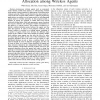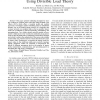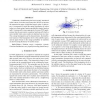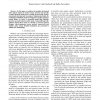149 search results - page 4 / 30 » Grouping Nodes in Wireless Sensor Networks Using Coalitional... |
CORR
2010
Springer
13 years 4 months ago
2010
Springer
—Autonomous wireless agents such as unmanned aerial vehicles, mobile base stations, or self-operating wireless nodes present a great potential for deployment in next-generation w...
ICC
2007
IEEE
14 years 2 days ago
2007
IEEE
—Recently, game theory becomes a useful and powerful tool to research mobile ad hoc networks (MANETs). Wireless LANs (WLANs) can work under both infrastructure and ad hoc modes, ...
GLOBECOM
2007
IEEE
14 years 3 days ago
2007
IEEE
Abstract— This paper presents scheduling strategies for sensing workload in wireless sensor networks using Divisible Load Theory (DLT), which offers a tractable model and realist...
ICASSP
2008
IEEE
14 years 6 days ago
2008
IEEE
Collaborative beamforming has been recently introduced in the context of wireless sensor networks (WSNs) to increase the transmission range of individual sensor nodes. In this pap...
CDC
2010
IEEE
13 years 23 days ago
2010
IEEE
In this paper we address the problem of physical node capture attacks in wireless sensor networks and provide a control theoretic framework to model physical node capture, cloned n...




